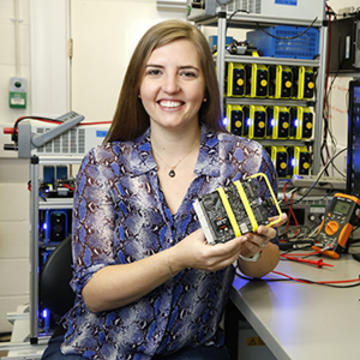Carolyn Hicks, CFO of Brill Power

Carolyn Hicks is the Chief Finance and Operations Officer at Brill Power, a spin-out company from the University of Oxford. Brill Power specialises in limiting battery wastage by extending the life-time of lithium-ion battery packs: the company works on accessing all of the energy inside, instead of allowing the most degraded battery to dictate the performance of the entire pack. Carolyn is trained in civil engineering, but after an MBA at the Said Business School she turned her attention to entrepreneurship. She now works on the technological development and operations of Brill Power.
What is your background? What made you decide to become an entrepreneur?
My background is in civil engineering. I worked for five years in engineering and transportation planning, looking at how transit influences cities as well as the economic, environmental, and social impact of the early stages of design. I then moved to the economics of transit, transferring slowly from engineering to business work. I thought it would be a great opportunity to come to Oxford for the MBA and study in such an amazing university and start moving beyond civil engineering. For the MBA, you have to do an entrepreneurship project where you take a concept all the way from the initial idea to the business plan. It was through that process that I considered the entrepreneurship route for the first time, as opposed to the infrastructure or finance routes.
It was the idea of improving battery design in particular that motivated me to become an entrepreneur. At the core of our motivation is the concept that batteries shouldn’t be wasted and that we should be efficiently using them. The level of waste shocked me, especially considering their global usage – half of the lithium-ion cells that are thrown away still have half their capacity left. I wanted to make a change – and it was the concept and the technology behind it which made me choose not to take a safe career in finance instead.

Entrepreneurship is about creating a team to achieve something that hasn’t been accomplished before.
How and when did you know your idea was good enough to develop it?
Winning the Climate KIC competition in 2015 was an essential seed to help us believe that something more was possible. Both getting the funding from the award, and having the validation from that process, were crucial.
But I think ultimately we’re still figuring that out – until you’re hugely successful you can’t know for sure.
What would you say are the top 3 skills that needed to be a successful entrepreneur? Why?
You need hustle – being able to sell yourself and your product to any audience, including people who aren’t just your customers but also your friends, family, and people who question your career paths, is really important.
You need empathy – being able to understand other people. An entrepreneur builds a team, and that team becomes their most important asset. You need to find the right people, which comes down to empathy.
You need confidence. There’s a typical personality that tends to end up in entrepreneurship, someone who is unusually confident about what they can achieve. When you’re working in a world competing with other people over-selling themselves, it’s easy to get lost even if you do have the best idea or skills or technology – without the ability to communicate that to someone else, you won’t survive. I think this is a barrier for women and introverts entering entrepreneurship in particular, as they typically don’t want to oversell what they want to achieve. But people don’t always have the time to assess what another person is able to do, so if you can help them with that by pointing out the things you’ve done, almost everybody will be interested in helping you. And people need help – they can’t check it all. So I always try to tell my friends not to under-estimate what they’ve accomplished!
You and your founding team also always need an excessive amount of positivity!
What is your favourite part of being an entrepreneur?
Working with the team – they’re awesome. I’m so happy with how they work together, how interested they are, and how talented they are. That’s become an additional source of motivation for me.
What individual, company or organization inspires you most? Why?
There’s a company called Bags of Ethics, which sells ethically-sourced products. They started with handbags, but during the pandemic they partnered with the British Fashion Council and a few different designers to make the switch to face masks. They’re great – they’re motivated by the right purpose, have created a successful company, and have been able to change and adapt given the times.
I also find inspiration in Starling Bank. It was started by a female CEO called Anne Boden, who became an entrepreneur later in life after working in large banks and corporations.
If you had 5 minutes with the above individual/ company/organization, what would you want to ask or discuss?
I would want to know how Anne Boden was able to overcome the attitude that you have to be young or male (or both!) to start a company. I’d ask what the secret is to retaining control once you’ve set up something that has become so successful, and how you grow with your company. She’s capable of following a company through that entire process, from using a different set of skills to start with at the beginning, incubating the idea, and then growing it. It’s something I’m looking to learn and do next.
What would you say have been some of your mistakes, failures or lessons learned as an entrepreneur?
There have been so many mistakes! But I think it’s easy to get focused on doing one thing. In the early days we had one project we wanted to complete, one technical milestone. That has helped us on our journey – but if we had a bit more diversity, or progressed our software with the same type of determination in thinking about how it partners with our hardware, we would have had a better diversification of risk. It’s helpful to have a back-up, and manage risk by having multiple opportunities running – so if one project gets delayed, there’s another one that could keep on moving.
How have you funded your ideas?
In the very early stages around 2016, we got funding from the Oxford Innovation Fund to pursue the technology development. We also received funding from Climate-KIC, an EU-funded organisation that helps renewable, clean-tech start-ups.
Now we’re funded by a mix of venture capital funding and funding from the government research grants available at Innovate UK and BEIS. It’s a good time to be in battery development – the Faraday Institution is a government organisation which is trying to get the UK to become a leader in automotive battery tech. The automotive industry is notoriously difficult to get into, so this is a great mechanism to help us engage with larger companies.
What is good about being an entrepreneur in Oxfordshire? Bad?
Doing the MBA at Oxford really expanded my horizons beyond civil engineering. It was during the course that I partnered with battery specialists working in Oxfordshire, and that’s how my involvement with Brill Power began. The Oxford start–up ecosystem is great and growing fast. There is access to investors, to great talent to grow your team, it is close to London (but not London), close to Heathrow for when you grow beyond UK’s borders and there is lots of industry in Oxford and Oxfordshire.
If a new entrepreneur or startup came to you looking for entrepreneurship resources, where would you send them?
The Oxford Foundry has a ton of resources and knowledge that might be helpful. It’s also important to find a mentor. You’ll have many mentors who will have different opinions – some will offer really valuable advice, and some will give advice that should probably be ignored, so it’s about finding a mentor that works for you.
Have you faced any challenges as a woman entrepreneur? If so, how have you overcome them?
I’m often the only female in a room. I can sometimes get extremely frustrated at the lacks of peers I see, especially since engineering, entrepreneurship, batteries and automotive industries are like a Venn diagram of very few females. That doesn’t necessarily mean I’m treated differently, though there are some examples of where I am, both for better and for worse. There are times where standing out in a crowd is particularly helpful – for instance when networking, it’s more likely that people will remember you. However, I have also experienced the expectation (which isn’t necessarily on purpose) that I’m less capable in terms of understanding technology. That may be my perception of how I’m being treated, but it’s something I’m constantly checking on.
It’s a matter of remembering that everybody comes with their own biases. There’s usually a way of overcoming them and working around them – and I always have allies who can help with that.
Do you have any advice for other women who want to be entrepreneurs?
Find your allies – and they’re just as often males as they are females. When you’re trying to express the boundaries you’re facing, you need to be able to be explained and understood. It’s best not to always assume that the barriers are gender-related – I’ve come out of meetings upset at how I think I’ve been treated differently, but my male colleague didn’t see the interaction that way. So we dig into it together, and work out if the bias wasn’t there, or if my colleague just didn’t see it. Sometimes it’s both.
I’m extremely passionate about getting more women into entrepreneurship and STEM, but I’m also conscious that the barriers we face are almost always unintentional, or not actually existing in the way we think they are. Sometimes the audience is expecting a certain type of personality regardless of gender. I’ve also seen and heard examples where women are being asked different or more personal questions, or experiencing biases because they’re pregnant – those things are certainly not okay, and they need to be dealt with differently. But the system will only change once you educate and involve people in that change: dismissing an interaction by saying ‘it’s because I’m female’ doesn’t help me fix anything, and usually only makes me feel worse.
What resources would you recommend for other women?
I find it very interesting and helpful to be part of women entrepreneur groups. You get to listen to what other women are saying and learn from their experiences, and it’s also a form of niche networking in and of itself.
Any last words of advice?
There’s never a good time to become an entrepreneur – but that also means there’s often never a bad time!
It’s a risk worth taking, but also one to be continually assessed. Just because you choose entrepreneurship, it doesn’t mean that will be your whole life. Be passionate about what you’re working on, and then see where that’s taking you – whether that’s entrepreneurship, working in a start-up, or in a company. As long as you’re developing your skills, you’re not making a bad decision.
Share this
More news



